
View the BCG Attorney Search Guide to America's Top 50 Law Schools.
While the below ruminations are largely anecdotal, they do summarize the collective views of most people in the legal community that I have picked up in my career as a legal recruiter.
In addition, all law schools have "cultures" that end up rubbing off on the people who spend three years of their lives at the school. Because of this, different schools create different psychologies that can be seen in their graduates years later. Do the grades or class rank during law school ultimately determine your level of success as an attorney? See Law School Grades and Your Career to find out the answer.
Think the law school you went to matters in the long run? Think again. See this article for more information: 10 Factors That Matter to Big Firms More Than Where You Went to Law School: Why the Law School You Went to Ultimately Does Not Matter as Much as You Think It Does to Major Law Firms.
Contents
- Stanford Law School
- Harvard
- The University of Virginia
- New York University
- Columbia
- The University of Chicago
- The University of Pennsylvania
- Yale Law School
- The University of Michigan
- The University of California Berkeley
- Duke
- Conclusions and Rankings
- Biography of Author
 Stanford is a great law school - one of my favorites. It is a small law school like Yale, selective like Yale and seems to basically attract the same quality of students but without an extreme level of inquisitiveness. The thing that is so nice about Stanford Law School is the complete absence of "pretension" that graduates of schools like Yale and Harvard seem to carry around.
Stanford is a great law school - one of my favorites. It is a small law school like Yale, selective like Yale and seems to basically attract the same quality of students but without an extreme level of inquisitiveness. The thing that is so nice about Stanford Law School is the complete absence of "pretension" that graduates of schools like Yale and Harvard seem to carry around.I've come across countless Stanford Law School graduates in my career. Almost universally, they are very intelligent, friendly, not aloof, easy to communicate with and hard working. They do not seem to push the envelope academically like people from a school like Yale might, but they are very well-suited to practice law. I honestly have nothing but good things to say about Stanford Law School graduates. Most also do quite well once hired and are even quite stable once they are part of the firm.
I have never quite understood the admissions process of Stanford Law School. For example, I once spent some time with the admissions director of Harvard Law School and he flat out told me it was all about numbers. I spoke with the Dean of Admissions from Yale Law School and she flat out told me that it was about numbers but also having a very inquisitive nature that translates into action.
I saw one of the admission deans from Stanford Law School speak years ago and he said something that I thought was very interesting. He said that if you take two people from similar schools with similar grade point averages and LSAT scores, there is not really much difference between them. Both are equally smart for the most part and both work hard. Any small differences in their grade point averages and LSAT scores are likely to be statistically insignificant. Thus, the admissions director said, what he looks for then is whether or not he likes the person.
I'm not sure if "likeability" is really the goal of the admissions staff at Stanford Law School, but there is something to it and I have found in practice that this law school turns out some exceptional, well-rounded and likeable attorneys. Being likeable is a very important part of being an attorney. For example, I believe it is less likely that a graduate of Stanford Law School will end up in a back room of a law firm answering questions in an "of counsel" position like someone from Yale Law School. A Stanford Law School graduate is far more likely to be on the "front lines" as a partner, bringing in business and being the face of a law firm.
Click here to read a full profile of Stanford Law School.
2. Harvard
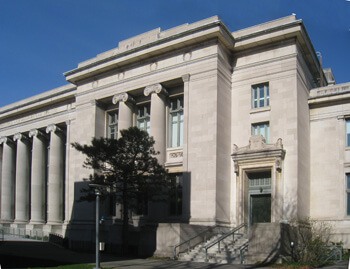 Harvard Law School is a very good law school for employers. While Harvard traditionally does not attract the same sort of students Yale does, the students that come out of the school are very well-suited to the practice of law and do very well in the legal world. Many of the students coming out of Harvard have the same depth as the ones from Yale; however, the diversity of the types of students that come out of Harvard makes the school very unique.
Harvard Law School is a very good law school for employers. While Harvard traditionally does not attract the same sort of students Yale does, the students that come out of the school are very well-suited to the practice of law and do very well in the legal world. Many of the students coming out of Harvard have the same depth as the ones from Yale; however, the diversity of the types of students that come out of Harvard makes the school very unique.Harvard attracts a huge pool of applications, and like most law schools bases its admissions primarily on "numbers"-i.e., LSAT and grade point averages. In addition, Harvard makes a major effort to get geographic diversity into its class. Therefore, if you are an exceptional student from a smaller state with a high LSAT score compared to other applicants from your state, you stand a good chance of being admitted. As mentioned earlier, this is far different than a school like Yale.
Because Harvard's admissions are so numbers-driven, the classes and students they attract are not much different than those you see at most top law schools - albeit, the students here are a bit smarter on average.
Law firms love Harvard graduates as they typically do quite well inside of this setting. They work hard, are generally quite committed and do well. In my opinion, from a recruitment perspective, graduates from this school are often a very smart choice for employers because they are quite balanced and do well.
While I am not sure how relevant this is, Harvard Law School graduates (like Yale graduates) to some extent often have a bit of an overly inflated sense of self importance that may make them a bit difficult to manage inside of law firms. Conversely, this is rarer for graduates of other top tier schools like Stanford and the University of Chicago. Due to this sense of self-importance, a higher than normal percentage of Harvard graduates will move firms if they feel they are not being coddled compared to other attorneys (I've seen this quite a bit) due to their pedigrees. Notwithstanding, I believe that Harvard graduates are, on the whole, really quite exceptional and well-suited for law firms. I also believe they are good attorneys once hired and most will do a good job representing companies, people and others. Moreover, a Harvard degree carries a lot of weight in the legal community and graduates are respected for this degree.
Click here to read a full profile of Harvard Law School.
3. The University of Virginia
 Students from the University of Virginia traditionally do exceptionally well in the law firm employment market. There are many reasons for this, in my opinion.
Students from the University of Virginia traditionally do exceptionally well in the law firm employment market. There are many reasons for this, in my opinion.Virginia has the feel of a collegial, well-run law firm. The students at Virginia are all very intelligent and there is a sort of "group mentality" among the student body that seems to be reinforced with softball and various activities. Students also make a great effort to behave in an anti-competitive manner with one another. There are no radical liberals on the faculty and the students all learn and work together in a "group speak" manner that is conservative in nature and generally reflective of a large law firm where order is essential.
Because the students know how to get along in groups, work hard, are smart and generally not overly ambitious like a Yale or Harvard student might be ("I want to be President and change the world!"), law firms like them a great deal. They don't usually rock the boat. The nature of the student body is also such that students typically know they need to work with others and thus do not have entitlement issues, issues with authority, or a need to prove something to themselves or others.
Because of all these reasons, I believe that law firms like University of Virginia graduates more than any other in the country because students fit in and do well there. However, it is because of many of these same reasons that you typically do not see students from this school succeed on a national scale like their counterparts from schools like Harvard or Yale.
Virginia is a state law school and has reduced admissions standards for in-state students – but still gets students that are exceptional in all respects. In fact, many native Virginians would probably choose Virginia over any law school in the country. For out of state students, the standards to get in can be as rigorous as a school like Harvard or Stanford. Due to its status as a state school and unique culture, Virginia is a first-choice school for a huge number of students who feel a sense of pride in a unique, state institution with a great culture.
Click here to read a full profile of the University of Virginia School of Law.
4. New York University
 New York University ("NYU") is one of the better schools for employers - especially in New York City. While the school does not have the cache of schools like Columbia or Harvard, the students from NYU are very motivated to work hard once hired. These students are employable and are much more likely to "fit in" than students from various other top law schools.
New York University ("NYU") is one of the better schools for employers - especially in New York City. While the school does not have the cache of schools like Columbia or Harvard, the students from NYU are very motivated to work hard once hired. These students are employable and are much more likely to "fit in" than students from various other top law schools.While I have no way of knowing why, I think that NYU students seem to take working for a law firm and doing well there a bit more seriously than students from a lot of other top law schools. NYU has not always been a top 10 law school and it has taken decades to rise up the rankings. My thought is that NYU students feel they have to work a bit harder than normal to prove themselves due to some sort of perceived inadequacy in comparison to the attorneys who surround them in major New York law firms from schools like Harvard, Columbia, and Yale.
Whatever it is, these attorneys are custom-made for top law firms and often do very well there. I have always been very impressed with attorneys from NYU. They are very motivated, hard-working and are generally very good attorneys.
Click here to read a full profile of New York University School of Law.
5. Columbia
 Columbia is an outstanding law school that produces graduates who are motivated (for the most part) to work in large law firms. Moreover, graduates of Columbia are extremely smart, motivated and typically do not take themselves all that seriously. The class generally has about 400 students. Columbia's proximity to New York City likely has a lot to do with why the students seem so motivated to work inside of law firms - they are surrounded by the largest law firms in the world. Columbia students are typically very intelligent and hard-working. They also (in my experience) have always seemed quite serious compared to graduates of other schools. For the most part, people who go to Columbia have the sorts of numbers and qualifications that would enable them to get into schools like Harvard but, for whatever reason, they are at Columbia instead. Many Columbia students would pro-actively choose Columbia over Harvard because they desire to be in New York City.
Columbia is an outstanding law school that produces graduates who are motivated (for the most part) to work in large law firms. Moreover, graduates of Columbia are extremely smart, motivated and typically do not take themselves all that seriously. The class generally has about 400 students. Columbia's proximity to New York City likely has a lot to do with why the students seem so motivated to work inside of law firms - they are surrounded by the largest law firms in the world. Columbia students are typically very intelligent and hard-working. They also (in my experience) have always seemed quite serious compared to graduates of other schools. For the most part, people who go to Columbia have the sorts of numbers and qualifications that would enable them to get into schools like Harvard but, for whatever reason, they are at Columbia instead. Many Columbia students would pro-actively choose Columbia over Harvard because they desire to be in New York City.Columbia is one of the better law schools for employers to look for appropriate employees. These graduates are programmed (so it seems) to choose law firms and commit there – much more than other schools. A law firm hiring a Columbia graduate in a major city, for example, is likely to be better off (as a general rule) than hiring a University of Michigan graduate, for example. There is just a staying power and a higher level of commitment and willingness to tough it out among Columbia graduates than other graduates I have seen.
I should also add that Columbia fosters a bit of intellectualism compared to schools like Harvard or Stanford. Columbia students and graduates seem to gravitate a bit toward bigger ideas that they can get excited about. They also generally have the idea to take important ideas and apply them in a practical manner.
Click here to read a full profile of Columbia University School of Law.
6. The University of Chicago
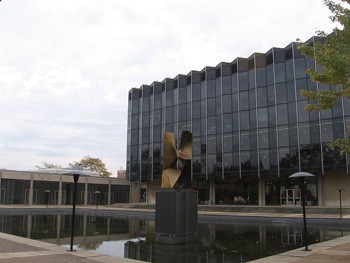 The University of Chicago runs a very numbers-driven admissions process and attracts a very high caliber of applicants (very close to what Yale Law School does.) Chicago is an exceptional law school in all respects. The atmosphere of the school tends to encourage students to go to large law firms and its graduates are more often than not interested in going to work there.
The University of Chicago runs a very numbers-driven admissions process and attracts a very high caliber of applicants (very close to what Yale Law School does.) Chicago is an exceptional law school in all respects. The atmosphere of the school tends to encourage students to go to large law firms and its graduates are more often than not interested in going to work there.What is interesting about Chicago is it is seems to be a slightly watered-down version of Yale Law School. Chicago has very small class sizes like Yale, is very selective like Yale, has academic professors who are at the same level as Yale, and has a reputation that is right behind Yale's. Yale has always been ranked the top law school and Chicago has often been ranked #2. The difference between the two schools, though, is that Chicago simply is not Yale. It does not produce the same sort of graduate.
Since I research and rate law schools and law firms for a living, this is quite interesting to me. Graduates of Chicago typically do not have the same level of confidence in themselves as Yale graduates. Their minds are quite curious as a general rule, but they don't always seem to take it as far. Yale gets people who are as smart as people who go to Chicago—but Yale also gets people who have something else, something powerful going on—an interest in politics or other strong extracurricular interests. People who go to Yale often end up in very important roles in government and public policy due to something they have inside them, while this is less likely for graduates of Chicago.
That said, I think Chicago gets the very, very smart people without the same sort of motivation level and potential for very significant achievement that Yale Law School does. The people who go to Chicago are more likely to be "more nerdy" than people from Stanford and are less likely to be a good fit inside a law firm than people from Columbia.
What I like about Chicago, though, is that many graduates are very motivated to work inside law firms and do remarkably well there. In addition, The University of Chicago Law School often admits students that are not the prototypical or stereotypical types one would expect to attend the school. For example, I once met a college cheerleader from a big ten school who scored in the 70th percentile on her LSATs and had good, but not great grades in college. This leads me to believe that the admissions office of this school does make an effort to admit a variety of people.
Learn the 10 Factors That Matter to Big Firms More Than Where You Went to Law School
Just as Columbia Law School students seem to stay and work in New York City more than average, Chicago students seem to stay and work in Chicago more than average.
Click here to read a full profile of The University of Chicago Law School.
7. The University of Pennsylvania
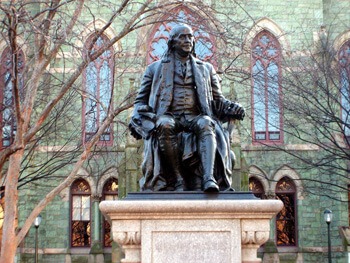 The University of Pennsylvania ("Penn") is a well-regarded law school, generally as a top ten law school. The school is well thought of on the East Coast and the majority of the graduates of this school end up staying there. Students coming out of this school generally end up at most of the top firms in the country and do well there.
The University of Pennsylvania ("Penn") is a well-regarded law school, generally as a top ten law school. The school is well thought of on the East Coast and the majority of the graduates of this school end up staying there. Students coming out of this school generally end up at most of the top firms in the country and do well there.Students who go to Penn are usually close to the quality of students who go to schools like Columbia and Harvard, but generally not quite the same. For the very top law school applicants in the country, Penn is often a safety school. Despite this status, I have always been quite impressed with students from Penn.
A final fact I have noticed repeatedly that is quite interesting about Penn is that students from here seem to be quite interested in writing, reading and other literary pursuits a bit more than other schools. There is a "lite" intellectualism about students from this school as a general matter that is nice to see. Students from here seem to be particularly well-suited to litigation.
All in all, this is an outstanding law school that produces excellent graduates.
Click here to read a full profile on The University of Pennsylvania School of Law.
8. Yale Law School
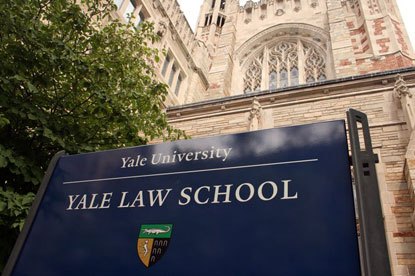 Yale Law School ("Yale") is typically ranked the best law school in the United States and has been for as long as I can remember. People who go to Yale Law School are generally "off-the-charts" smart and have interests that often transcend academics. For example, many have interests in things like improving inner city schools, politics and so forth. Most are deep-thinkers and have an interest in the classics and other non-law related subjects. Most are complete academic standouts and exceptional in all respects.
Yale Law School ("Yale") is typically ranked the best law school in the United States and has been for as long as I can remember. People who go to Yale Law School are generally "off-the-charts" smart and have interests that often transcend academics. For example, many have interests in things like improving inner city schools, politics and so forth. Most are deep-thinkers and have an interest in the classics and other non-law related subjects. Most are complete academic standouts and exceptional in all respects.The ability to be extremely smart and be able to focus and get passionate about ideas is what separates Yale students from the pack. Most could, for example, be very highly regarded professors of a non-legal discipline before ever going to law school if they stuck with it. Most importantly, they would enjoy being professors. This is the primary difference—on a global level—between the people who go to Yale as opposed to most other law schools. The people who go to Yale generally are very, very interested in ideas. The students are for the most part on a different level. When discussing a law school like Yale, it is important to understand what makes it so different than say Harvard, Columbia or other top law schools. If you go to a school like Montana State, major in accounting, are one of the top 2 or 3 students in your class and get in the 98th percentile on the LSATs, your odds of getting into Harvard are very good.
Those sorts of numbers will get you looked at by a law school like Yale, but Yale is more likely to be interested in the person with those sorts of grades from a better school, who also is very interested in accounting policy, who has worked on Capitol Hill in the summers for an accounting group that lobbies for a certain sort of policy idea related to accounting. Moreover, the odds would be very good that the person going to Yale also has written papers that have found national-level acceptance in accounting.
Harvard has a large class of 550 compared to Yale's 170 or so. However, Harvard is very numbers driven.
The problem with Yale Law School students and graduates, however, is that the culture of the school imparts an idea in many of the students that they are too good for law firms, or normal jobs (which is often true.) It is very rare to see any sort of law firm stability in the graduates. They are hard workers but are often aloof to the demands of a law firm and see larger-picture issues in the world that need their intelligence and attention. Yale Law School graduates' resumes are often littered with various policy jobs, academic jobs and other things that have very little to do with the practice of law. Many write books and do other interesting things.
In the law firm environment, Yale Law School graduates can do very, very well if they apply themselves. The issue often is, however, that they become interested in long, drawn out analysis of simple issues and are not attuned to client demands of keeping bills down. They often find the attorneys they are working with to be one-sided and one-dimensional. While the attorneys they are working with are thinking of larger houses, fancier cars and similar things, a Yale Law School graduate is likely to be happier with an apartment full of interesting books, enough leisure time to go to lectures, and quiet time to write – even if that means living alone.
From my perspective, Yale Law School is an excellent school but one which is more often a "miss" than a "hit" because the students are unlikely to be interested for any length of time in working on boring issues that large corporations have. Notwithstanding, because of Yale Law School's incredible reputation, law firms love having people from Yale and frequently hire them only to see many disappear within a few years.
See What Yale Law School Teaches about How to Approach Your Legal Career That No Other Law School Does for more information.
Most Yale Law School graduates are capable of extraordinary success—in both the law firm environment and outside of it. I would be remiss, though, if I did not mention the sort of role that many of these graduates find themselves in later on in their careers vis a vis law firms (or not.) There are not a ton of law firms out there that can afford to have powerful partners who do not consistently go about generating a lot of business – and who do not have good client relation skills. For whatever reason, due to the sorts of people that Yale admits (academic nerds and other stereotypes), graduates of Yale Law School do not always fare well inside law firms. In the Los Angeles legal community, I run across them all the time. These smart attorneys are likely to be found in "of counsel" roles inside law firms where they can be paid to offer their insights, but not accountable for generating business. Many cannot tolerate the indignity of not being at the top of the pecking order and end up leaving for government and academic jobs.
A great number of Yale Law School graduates find themselves in government and academia roles. There are several reasons for this. One of these reasons, though, is there is less accountability for bringing in business and the rules for getting ahead are far different. In academia, for example, Yale Law graduates can get ahead by writing a good paper just like they may have done in college or law school. In the government realm, the graduates are paid to make decisions and pontificate, regardless of whether it makes money from this.
In terms of hiring an attorney, the weakness of many Yale Law School graduates is that they are more likely than not to over analyze issues, to not understand the business component of what they are doing and to take themselves quite seriously. Conversely, the ones with very good social skills who do have a good understanding of business can be nothing short of exceptional (people like Bill Clinton, Gerald Ford, Hillary Clinton, David Boies, and Floyd Abrahams). The list of alumni of the school and their accomplishments is nothing short of astonishing for such a small school.
http://en.wikipedia.org/wiki/List_of_Yale_Law_School_alumni
Click here to read a full profile of Yale Law School.
9. The University of Michigan
 The University of Michigan ("Michigan") is a great law school. It is, in fact, a school that takes itself extremely seriously in Michigan and a first-choice school for a lot of people from Michigan. Students from here are hard-working and are generally quite solid in all respects. Michigan is an extremely competitive school for the students there. It breeds a competitive attorney that I believe does very well in the employment market. I've seen lots of students succeed at a high level from Michigan.
The University of Michigan ("Michigan") is a great law school. It is, in fact, a school that takes itself extremely seriously in Michigan and a first-choice school for a lot of people from Michigan. Students from here are hard-working and are generally quite solid in all respects. Michigan is an extremely competitive school for the students there. It breeds a competitive attorney that I believe does very well in the employment market. I've seen lots of students succeed at a high level from Michigan.Michigan does not necessarily produce graduates who always get the best jobs. I've seen a lot of graduates of this school struggle to get jobs. In my opinion, the reason for this is the school's Midwestern focus. Unlike the University of Chicago, a school that attracts a lot of East Coasters from Ivy League colleges that then go back to work on the East Coast, Michigan is an incredibly numbers-driven school for admissions. It therefore gets a lot of people from around the Midwest who went to smaller colleges and take tests well. These students often want to stay in the Midwest where jobs are scarcer than on the coasts.
Click here to read a full profile of The University of Michigan School of Law.
10. The University of California Berkeley
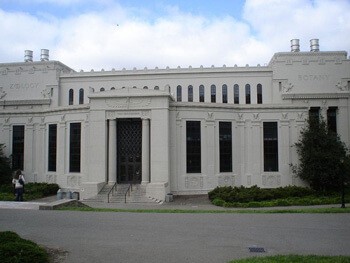 The University of California Berkeley ("Berkeley") is a law school of similar caliber to Virginia. Students who go to this school are extremely intelligent and do quite well in the job market. Surprisingly, despite Berkeley's liberal reputation as a university, some students coming out of this school are often not that liberal and may fit in quite well—though others do not.
The University of California Berkeley ("Berkeley") is a law school of similar caliber to Virginia. Students who go to this school are extremely intelligent and do quite well in the job market. Surprisingly, despite Berkeley's liberal reputation as a university, some students coming out of this school are often not that liberal and may fit in quite well—though others do not.The students that do not get overly-committed to a given cause often do very well in the law firm employment market. Many students from this school wind up in their head and a bit angry. These students, typically, are those at the top of their class.
There are a few issues with Berkeley that I believe merit a bit of discussion. The liberal nature of many Berkeley students means that many almost reflexively question all types of authority—whether it be how things work in a law firm or the propriety of a corporate client's motives for doing something. This means that many move through their careers in a way that is not necessarily compatible with long-term success in a law firm environment.
Notwithstanding, the ability to get behind a cause (a client's, for example) means that many graduates of Berkeley are likely to experience great success if they can tap into a passion for something. This is a characteristic of graduates of this school that is meaningful.
I have seen numerous successful students from this school; however, more often than not students from here can be trouble in a law firm environment. This is partially due to their independent streak – and may be due to other factors I do not understand. One thing I can say for certain, though, is that I have seen graduates of this school be almost universally extremely smart and quite confident. These are characteristics that ideally could make anyone from this school do extremely well. However, the sense of entitlement that breeds this confidence is a big part of the problem with students from this school.
Click here to read a full profile of The University of California Berkeley School of Law.
11. Duke
 Duke is one of the more interesting law schools I have ever encountered. On one hand, the school attracts very intelligent students who, by all appearances, are motivated, intelligent and poised for success in the law. On the other hand, there appears to be something "off" about the culture of this school because, in my experience, Duke graduates are more prone to psychological breakdowns than law school graduates from many other schools.
Duke is one of the more interesting law schools I have ever encountered. On one hand, the school attracts very intelligent students who, by all appearances, are motivated, intelligent and poised for success in the law. On the other hand, there appears to be something "off" about the culture of this school because, in my experience, Duke graduates are more prone to psychological breakdowns than law school graduates from many other schools.You will find graduates of Duke at most of the best law firms in the country. Here, they often do extremely well and fit in quite well. For the most part, there are a lot of good students coming out of Duke that can succeed at a high level in the practice of law. The best students are not overly intellectual but quite smart. There is a bit of an "elitism" of graduates of this school that is almost like they are part of a Southern aristocracy. For example, students and graduates have the sort of confidence in their institution that someone from a school like Harvard would. For a Southerner, going to Duke might actually be preferable to going to a school like Harvard.
In my career as a legal recruiter, I can honestly say that a significant percentage (probably as many as 30%) of the attorneys I have encountered from here had serious personal and professional issues. For example, one attorney I encountered years ago wrote a book about how many women he had slept with and abused sexually (Tucker Max) that was made into a movie. For some inexplicable reason, Duke graduates are often fired from law firms and appear to be more burned out and/or mentally exhausted than graduates from other schools.
At least a few attorneys I have encountered from here ended up being hospitalized for stress issues related to working in a law firm.
See 25 Reasons Most Attorneys Hate the Practice of Law and Go Crazy (and What to Do about It) for more information.
There is something going on with the culture of Duke Law School that does not make a lot of sense to me. My thought is that there may be a lot of social pressure at the school that breaks people in the long run.
All of the negativity aside, if a student comes out of Duke, keeps it together and does well, they can have exceptional careers. The students are certainly smart enough to do whatever they want. Students from this school are quite employable wherever they want to go. For example, I would estimate that a similarly situated student (grades and class rank) from Duke is much more employable that students from similarly ranked schools like Michigan and Berkeley, for example.
Click here to read a profile of Duke Law School.
Conclusions and Rankings
As a legal recruiter, one of the main questions that I am always asking is this: Will the person do well if they are employed at a law firm and will they stay? In addition, another question is: Will the person do the job long term? As crazy as it sounds, the cultures of any given law school will often assist employers (and me) in answering this question.
I am not concerned about people who are going to change the world with a book or some sort of political job. I'm concerned about people who are smart, hard-working and will get the job done – and survive.
That said, here are my rankings (again) of long-term graduate employability and desirability for employers. The equation is simple: What graduate would I hire if I were a legal employer betting on the person likely to do the best in all respects?
- Stanford
- Harvard
- Virginia
- New York University
- Columbia
- Chicago
- University of Pennsylvania
- Yale
- Michigan
- Berkeley
- Duke
 |
| Harrison Barnes |
Harrison Barnes has elevated the practice of legal recruiting to its very highest level through some very simple beliefs. While the statement that a search firm is "different" may sound like a cliché, Harrison does indeed lead a search firm that is different from any major American legal recruiting firm. Not only does BCG Attorney Search get more attorneys jobs inside law firms than any other search firm in the world, but through the separate but affiliated companies Harrison has founded, over 10,000 attorneys find new positions each year. This has been accomplished by adhering to four core beliefs that permeate everything BCG Attorney Search does.
Read his full bio.
Submit Your Resume
See top legal recruiters on LawCrossing.
Please see the following articles for more information about law school, the bar exam and succeeding in your first year of practice:
- Acing Law School Exams: Grade-A Advice
- What's Next after Finishing Law School
- First Year of Law School Survival Tips
- Does Law School Rank Determine Success?
- The Three Major Legal Fraternities and Why You May Want to Join One
- Late Bloomers: Going to Law School Later in Life
- Coping with Law School Dismissal
- Graduated From a Tier 3 Law School: There’s much you can do with your degree
- The Real World: Life after Law School
- Why You Should Think Twice About Remaining in Law (or Going to Law School)
- Should You Marry a Lawyer? A Couple's Guide to Balancing Work, Love and Amibition
- After Law School, B-School: The Rise of M.B.A.'s Among Attorneys
- Law Schools at Historically Black Colleges and Universities
- Non-ABA-Accredited Schools May Offer Good Alternative
- The Five Stages of Every Legal Career
- "Guidelines on Reciprocity or "Admission on Motion" among the States as per American Bar Association"
- Pass the Bar in One State, Work in Another
- Taking the Bar in Multiple States
- 10 Ways to Bounce Back After Failing the Bar and Pass on Your Next Attempt
- Don't Panic! Ten Tips for Surviving the Bar Exam
- New York's Exam: The Biggest Baddest Bar
- If You Have Failed the Bar Exam It Is Not the End of the World
- Barriers Fall for Out-of-State Attorneys
- The 10-Step, ''No-Fail'' Guide to Distinguishing Yourself as a First-Year Associate
- The Art of Drafting a Proper Legal Memo
- 5 Tips for First Year Law Firm Associates
- Top 39 Tips for New Litigation Associates and Trial Lawyers: How to Be a Good Litigation Attorney
- 2015 1st Year Salaries and Bonuses of the Top Law Firms




